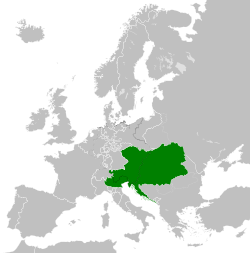Imperial Austria
| Austrian Empire | ||||||||||||
| Kaisertum Österreich (German) | ||||||||||||
|
State1 of the Holy Roman Empire (1804–1806) State1 of the German Confederation (1815–1866) |
||||||||||||
|
||||||||||||
|
||||||||||||
|
Anthem Gott erhalte Franz den Kaiser "God Save Emperor Francis" |
||||||||||||
|
The Austrian Empire in 1815.
|
||||||||||||
| Capital | Vienna | |||||||||||
| Languages | German, Hungarian, Czech, Slovak, Polish, Ruthenian, Slovene, Croatian, Serbian, Romanian, Italian, Ukrainian | |||||||||||
| Religion | Roman Catholic | |||||||||||
| Government | Absolute monarchy | |||||||||||
| Emperor | ||||||||||||
| • | 1804–1835 | Francis I | ||||||||||
| • | 1835–1848 | Ferdinand I | ||||||||||
| • | 1848–1867 | Franz Joseph I | ||||||||||
| Minister-President | ||||||||||||
| • | 1821–1848 | Metternich (first) | ||||||||||
| • | 1867 | Beust (last) | ||||||||||
| Legislature | Imperial Council | |||||||||||
| • | Upper house | Herrenhaus | ||||||||||
| • | Lower house | Abgeordnetenhaus | ||||||||||
| Historical era | Modern era | |||||||||||
| • | Proclamation | 11 August 1804 | ||||||||||
| • | Dissolution of the Holy Roman Empire | 6 August 1806 | ||||||||||
| • | Congress of Vienna | 8 June 1815 | ||||||||||
| • | Constitution adopted | 20 October 1860 | ||||||||||
| • | Austro-Prussian War | 14 June 1866 | ||||||||||
| • | Peace of Prague | 23 August 1866 | ||||||||||
| • | Compromise of 1867 | 30 March 1867 | ||||||||||
| Area | ||||||||||||
| • | 1804 | 698,700 km² (269,770 sq mi) | ||||||||||
| • | 1918 | 681,727 km² (263,216 sq mi) | ||||||||||
| Population | ||||||||||||
| • | 1804 est. | 21,200,000 | ||||||||||
| Density | 30.3 /km² (78.6 /sq mi) | |||||||||||
| • | 1918 est. | 52,000,000 | ||||||||||
| Density | 76.3 /km² (197.6 /sq mi) | |||||||||||
| Currency |
Thaler, (1804–1857) Vereinsthaler (1857–1867) |
|||||||||||
|
||||||||||||
| Today part of | ||||||||||||
| 1Territories of Austria and Bohemia only. | ||||||||||||
The Austrian Empire (Austrian German: Kaiserthum Oesterreich, modern spelling Kaisertum Österreich) was an empire in Central Europe created out of the realms of the Habsburgs by proclamation in 1804. It was a multinational empire and one of Europe's great powers. Geographically it was the second largest country in Europe after the Russian Empire (621,538 square kilometres [239,977 sq mi]). It was also the third most populous after Russia and France, as well as the largest and strongest country in the German Confederation. Proclaimed in response to the First French Empire, it overlapped with the Holy Roman Empire until the latter's dissolution in 1806. The Ausgleich of 1867 elevated Hungary's status. It became a separate entity from the Empire entirely, joining with it in the dual monarchy of Austria-Hungary.
Changes shaping the nature of the Holy Roman Empire took place during conferences in Rastatt (1797–1799) and Regensburg (1801–1803). On 24 March 1803, the Imperial Recess (German: Reichsdeputationshauptschluss) was declared, which reduced the number of ecclesiastical states from 81 to only 3 and the free imperial cities from 51 to 6. This measure was aimed at replacing the old constitution of the Holy Roman Empire, but the actual consequence of the Imperial Recess was the end of the empire. Taking this significant change into consideration, the German Emperor Francis II created the title Emperor of Austria, for himself and his successors.
...
Wikipedia



